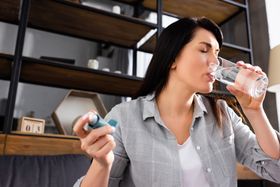4 Best Water Types to Drink for Cellular Hydration
Thirsty for optimal health? We reveal the best water types for optimal cellular hydration. Boost your energy and unlock your body's full potential.
Updated February 4, 2025

You guzzle water all day, thinking you’re doing your body a favor. But are you really hydrating your cells?
The truth is that not all water is created equal when it comes to quenching your body’s thirst at the cellular level. Dehydration can lead to a cascade of problems, from fatigue to compromised organ function.
So, which water is actually best for optimizing your body’s performance?
Let’s dive in.
What Is Cellular Hydration?
Cellular hydration refers to the water content within your body's cells, essential for maintaining cell structure, facilitating chemical reactions, transporting nutrients, and regulating body temperature.
To achieve optimal cellular hydration, drink plenty of water, eat water-rich foods, balance electrolytes, limit diuretics, and consider supplements under professional guidance.
4 Best Water Types to Drink for Hydration
1. Structured Water
Structured water (H₃O₂) is the result of altered molecules that form a hexagonal pattern. It's similar to the uncontaminated water found in springs and glaciers.
Aside from intercellular hydration, it has many health benefits like:
- Stronger immune system
- Healthier digestion
- Greater energy
- Lower toxicity
- Better sleep
You can make structured water in many ways, but the most reliable is via vortex technology like the MAYU Swirl. The device is simple: place the impeller in the pitcher, put both onto the base and turn the device on. The swirling motion aerates your water, improving its taste and hydrating you.
» Learn more about creating structured water with MAYU Swirl
2. Mineral Water
Mineral water is one of the best sources if you want to boost your cellular hydration. Here's why:
- It's a rich source of magnesium, which positively affects muscles.
- It has calcium that's essential for strong bones.
- It provides the body with crucial electrolytes like sodium—boosting inner cellular hydration.
Drinking mineral water also relieves constipation, promotes heart health, lowers blood pressure, and improves circulation.
» Find out what is the best water to drink
3. Spring Water
Spring water rises from the underground and pours to the surface. It has several characteristics that boost inner cellular hydration:
- Has Minerals: Spring water is rich in minerals that are beneficial to the body. Magnesium strengthens your bones, potassium supports nerve signaling, and zinc boosts the immune system. And sodium? It balances fluid levels in the body, supporting cellular hydration.
- Balances Your PH Levels: Maintaining the proper pH balance is essential for healthy cellular function and hydration. Drinking spring water regulates your body's acidity, which can cause peptic ulcers or esophagitis.
- Doesn't Contain Chemicals and Bacteria: Tap water comes with chemicals and harmful bacteria. On the other hand, spring water doesn't have any contaminants. It's a safer option for drinking.
- Supports the Body With Oxygen: Drinking spring water will provide your body and brain with more of the much-needed oxygen.
- Improves Digestion: The digestive system benefits from spring water. It supports proper cellular hydration and helps your body dissolve food, reducing the risk of constipation.
4. Filtered Water
Reverse osmosis is a popular method for purifying tap water. It removes lead, asbestos, chemicals, heavy metals, and bacteria. But removing all these impurities also leaves your water drained of its precious minerals.
That's why we've come up with a solution
» Make sure your water is healthier than ever with mineral drops
Reap the Health Benefits of Cellular Hydration
Water is crucial for maintaining optimal health and well-being. It helps regulate body temperature, aids in digestion, promotes healthy skin, and supports proper kidney function.
To ensure that your body receives the necessary hydration and minerals, it's important to drink clean, pure water, aiming for half a gallon daily. By achieving cellular hydration, you can support your body's optimal functioning and promote overall health.
» Create structured water and boost your cellular hydration
FAQs
Which foods are 90% in water and can help with hydrating?
Many fruits and vegetables are high in water content. Watermelon, cucumber, strawberries, and lettuce are excellent choices.
How long does it take to hydrate cells?
Hydration time varies. Mild dehydration can improve within hours. Severe cases might take days. Factors like dehydration level, fluid intake, and overall health influence the process.
Which salt is good for cellular hydration?
Regular table salt (sodium chloride) is sufficient for most people. It provides the sodium essential for cellular hydration. While specialty salts like Himalayan or Celtic offer trace minerals, their impact on hydration is minimal. Consult a healthcare professional for specific advice.
How do I check my hydration level?
» Check urine color: Pale yellow is good, and dark yellow indicates dehydration.
» Pinch skin test: Gently pinch the back of your hand. Skin should snap back quickly. Slow return indicates potential dehydration.
Note: For severe symptoms, consult a healthcare professional.
What causes cell dehydration?
Cell dehydration occurs when the body loses more fluids than it takes in. Common causes include:
» Not drinking enough fluids
» Excessive sweating due to illness or physical activity
» Diarrhea and vomiting
» Some drugs can that increase urine output
Disclaimer: The information published by Mayu Water is not a substitute for the expert knowledge, advice, and recommendations of trained professionals. We strongly recommend consulting with industry experts and primary or scientific sources before making any health, research-related, or other important decisions.













































